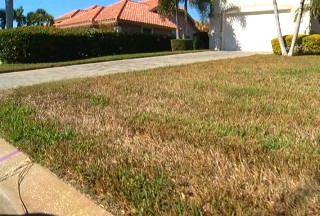|
Article
Courtesy of Bay News 9 By
Cheryl Glassford
Published
December 14, 2014
ST. PETERSBURG -- A team of researchers with the University of Florida is examining ways to fight a virus killing lawns in Bayway Isles in southwest St. Petersburg.
Lawncare specialists say the Mosiac Sugarcane Virus is killing lawns throughout the residential neighborhood.
The virus attacks the lawns, quickly killing St. Augustine grass and turning lawns yellow and brown.
Lawncare Specialist Scott Stroemich said the virus, the first he can recall that attacks Florida lawns, has no cure right now.
"It's a very unique situation," said Stroemich, who recently sent Bayway Isles grass samples to labs in Gainesville. "And its' basically uncontrollable. All of them came back as positive as the sugarcane mosaic virus."
The virus got its name after first appearing in sugarcane in the 1960s. Growers developers plants resistant to the virus by scientists are not sure how the virus
transferred to grass 50-plus years later. Cases have only been confirmed in Pinellas and Palm Beach counties. |
|
Lawncare specialists say the Mosiac Sugarcane Virus is killing lawns throughout a St. Pete residential neighborhood. The virus attacks the lawns, quickly killing mainly St. Augustine grass.
|
"Something has changed either in the host or in the virus itself," said Dr. Phil Harmon, a professor at
UF. "And that's part of the research that we're doing at the University of Florida, trying to determine what that is that's changed and what we can do about it."
About 200 samples of Floratam and St. Augustine grass from affected Pinellas County neighborhoods were analyzed.
While they're is no chemical treatment, officials have been able to stop the spread in some lawns.
The infected lawns tend to die from the virus in September and October. Other types of grass, like bitterblue and palmetto seem to be more resistant to the virus.
Harmon and other UF researchers are asking anyone in the Bay area who thinks their lawns are infected to report it to the UF plant diagnostic center.
|
